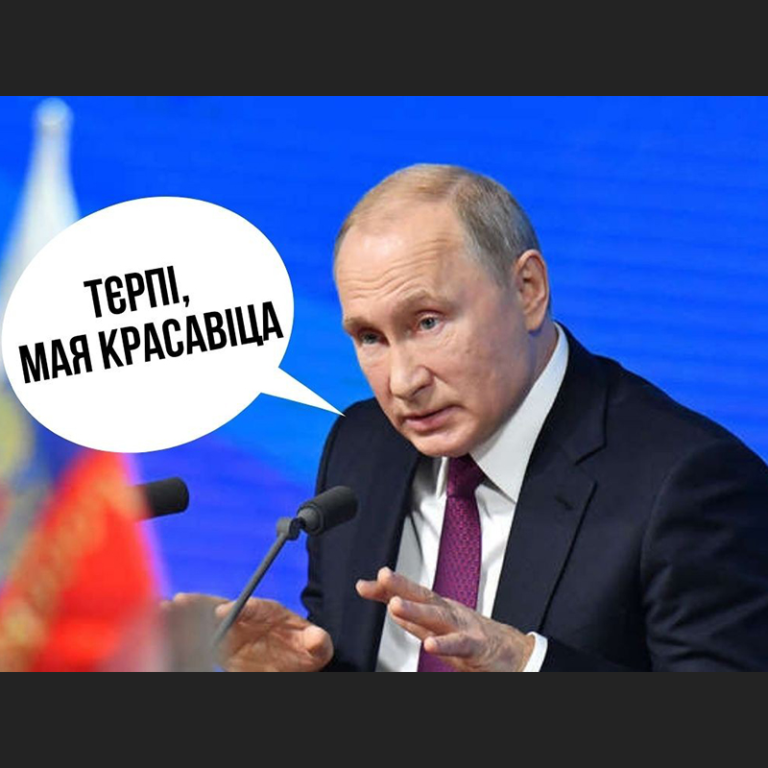
“Whether you like it or not, endure it, my beauty” – Putin used a phrase that has sexual assault connotation while talking about Ukraine during a press conference at the beginning of February 2022. The veiled threat of coercion and sexual violence from Russia’s president hints at the larger feature of internal and external Russian politics, as well as at the mentality of its citizens. It literally characterises the behaviour of the Russian army that uses rape and terror as a weapon against the civilian population. The occupiers use rape against Ukrainians of different genders and ages en masse, while their wives in Russia not only approve but also encourage such violence.
We’ll explain why rape as a war tactic is a war crime, where survivors can turn for help, and why this problem requires more coverage.
The behaviour of Russian soldier-rapists, in Ukraine, isn’t surprising if you understand what kind of social and cultural environment they come from. Gender-based violence is common in Russian society. In 2017, the Russian State Duma decriminalised domestic violence, and now it is considered just an administrative offence. Russian officials even avoid the name of this crime by calling it a “one-time beating caused by a close relative” instead. The campaigns against criminalisation of domestic violence were spearheaded by the Russian Orthodox Church, radical right-wing, Ukrainophobic Russian organisations such as The Double-Headed Eagle, The Union of Orthodox Citizens, Forty Times forty, The Parental All-Russian Resistance, and others.

In 2019, the European Court of Human Rights (ECHR) obliged Russia to tighten sectoral legislation to counteract domestic violence. The prerequisite was a lawsuit of a Russian woman who suffered from sexual violence and persecution by her ex-partner. However, the court case didn’t succeed because back in 2015, Putin adopted the amendments to the law “On the Constitutional Court of the Russian Federation” that allowed him to not recognise the decisions of the ECHR. Against the backdrop of the war in Ukraine, on the 11th of June, the president of Russia signed the law on non-enforcement of the ECHR decisions, adopted after the 15th of March 2022.
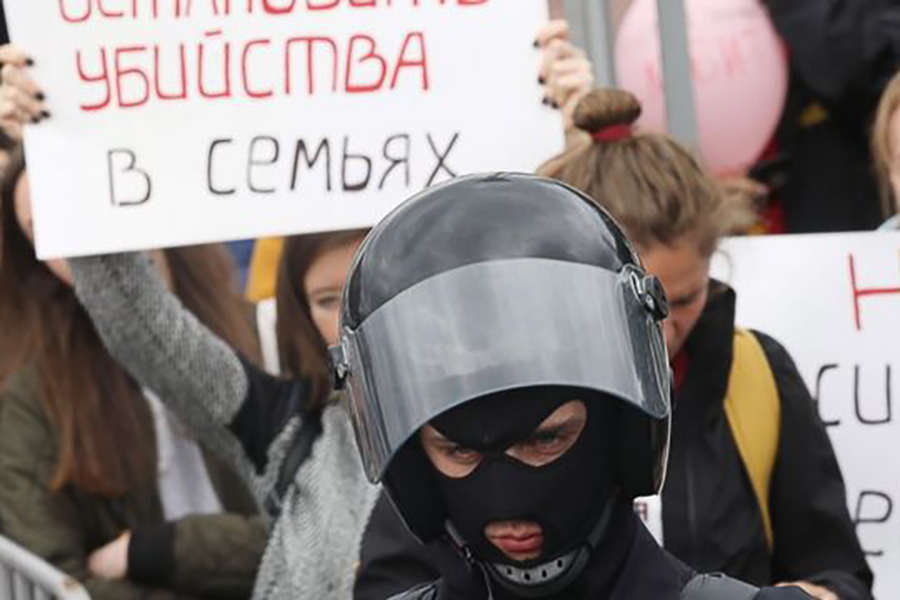
Photo: Getty Images.
Meanwhile, Ukraine is one of the countries that were authors of the Istanbul Convention (“the Council of Europe Convention on preventing and combating violence against women and domestic violence”) that was signed by Ukraine among the first countries on the 11th of November 2011. This document aims to protect people from domestic violence and gender-based violence. Pro-Russian and conservative forces had been preventing the ratification of the document for ten years. Ukrainians were holding rallies, protests, and media campaigns to support the Istanbul Convention, and each of the two petitions to the president demanding to adopt the Convention gained 25,000 votes. Finally, on the 22nd of June 2022, Ukraine ratified the Istanbul Convention as one of the demands for getting the country’s EU candidate status.
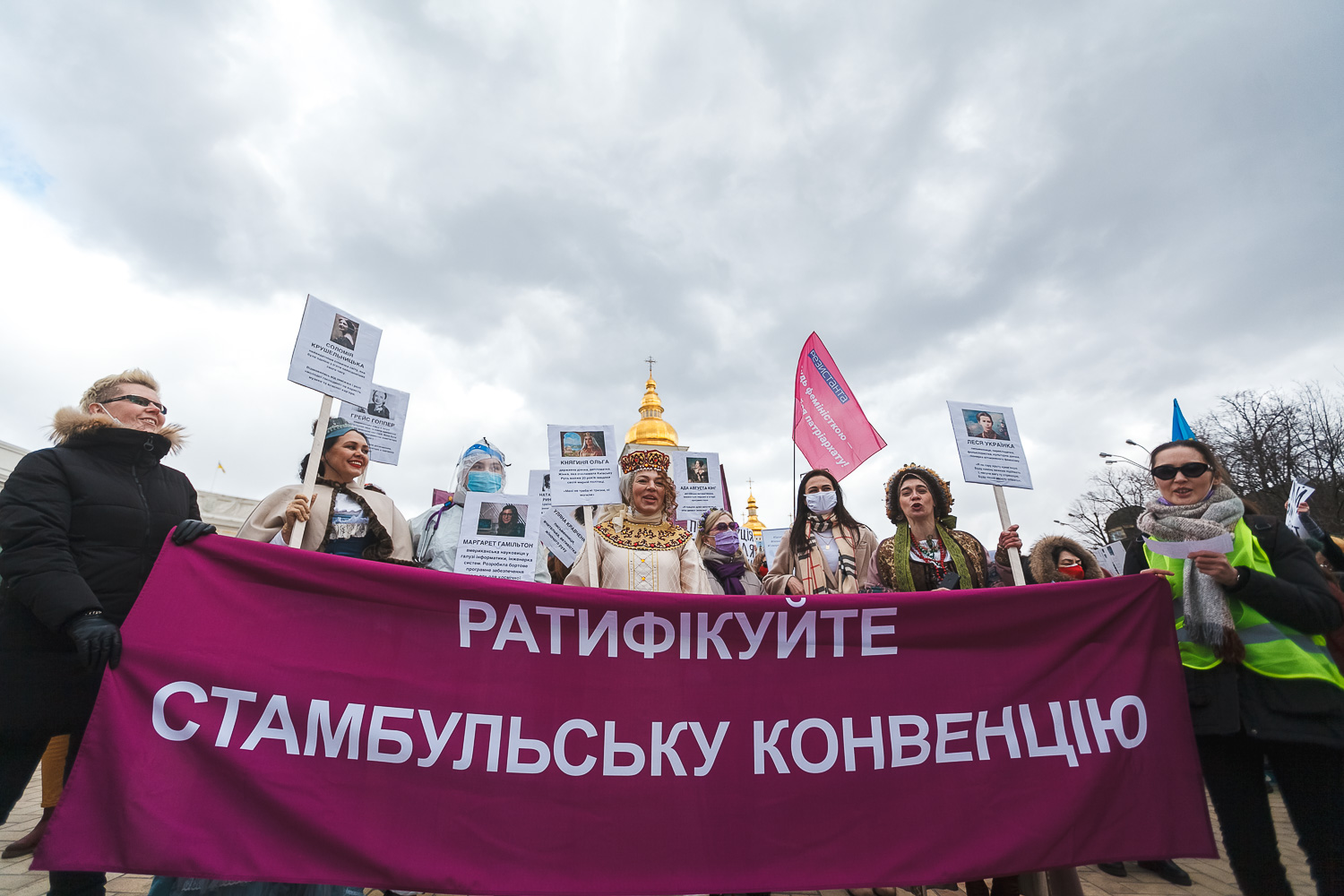
Photo: Yurii Stefanyak.
What does the law say?
Rape and other sexual crimes during war are considered violations of the laws and customs of war, and also international humanitarian law – Article 27 of the Geneva Convention (1949) and the Additional Protocol to the Geneva Conventions (of the 12th of August 1949). Such actions (forced exposure, forced sterilisation, coercion to prostitution, etc.) are classified as war crimes and crimes against humanity. In 1988, the International Criminal Tribunal for Rwanda defined rape as means of genocide for the first time. In 2000, the International Criminal Tribunal for former Yugoslavia in The Hague called rape a crime against humanity.

By international law, which is ratified in Ukraine as well, different forms of sexual violence fall under the definition of a torture (cruel, inhuman or degrading treatment of people). Ukrainian legislation doesn’t define the term “war crime” and classify rape as a separate war crime. However, “the violation of the laws and customs of war” is punished by imprisonment from 8 to 12 years.
War crimes and crimes against humanity are investigated by the International Criminal Court in The Hague according to the Rome Statute with consideration of statutes and the experience of international tribunals for former Yugoslavia and Rwanda. Under international law, such crimes
have no expiration date. This means that Russian servicemen, who committed crimes, will be sought out internationally, and then prosecuted. War crimes and crimes against humanity involve the command responsibility. This means that not only rapists, but also their commanders will be prosecuted. In addition, war criminals can’t be subject to amnesty.

Under the Ukrainian law, criminal offences against sexual freedom and sexual inviolability of a person are rape, sexual violence, compulsion to sexual intercourse, committing acts of sexual nature with a person under 16, molestation of minors, and harassment of children. In 2019, in Ukraine, the updated definition of rapewas introduced. Under this new definition, rape is classified based on the absence of voluntary consent of a person. Under previous legal framework, a survivor had to prove that threat of physical violence was present or that violence was used, or that a perpetrator took advantage of an incapacitated victim. It is worth noting that people of all genders suffer from sexual assault, although statistically women are the most affected group.
Rape as a weapon

History is full of cases when women massively suffered from rape and other sexual crimes during wars. According to estimates of British historian Antony Beevor, during the Second World War, Soviet troops raped approximately 2 million European women. In his book Berlin: The Downfall 1945, Beevor often provides reports about numerous crimes committed by the Red Army soldiers in East Prussia. Records that prove this are stored in the Russian state archive. At that time, many women resorted to killing children and committing suicide, just not to fall into the hands of rapists. German historian Barbara Johr, writes that in Berlin alone, Soviet soldiers likely raped up to 600,000 women. The terrible details about mass rape were outlined in such books as Why Was I born a Girl? by the prominent physicist Gabriele Köpp, A Woman in Berlin by the journalist Marta Hillers and other survivors.
On the 3rd of April 2022, Melinda Simmons, British Ambassador in Ukraine, called rape a weapon deliberately used by the Russian troops in Ukraine. History shows that Russia has been sharpening this type of weapon for years.
During the Bosnian war and the genocide in Srebrenica (1992-1995), Serbian troops were creating “rape camps” and compulsory brothels in the local hotels. The tragically known hotel Vilina Vlas was a concentration camp and one of the central places of mass violence. There, about 200 Bosnian women were forcibly held, raped and beaten. According to the Association of Women Victims of War, less than ten women survived their imprisonment in Vilina Vlas. In general, according to various estimates, from 20 to 50 thousand women were affected by rape and other sexual crimes in Bosnia. Men became victims, too. The 2017 Amnesty International report states that tens of thousands of survivors still haven’t obtained the appropriate compensation and their offenders were not punished. Igor Girkin, the terrorist from so-called DPR and LPR, started his “career” in Bosnia on the side of the Serbian army. He was recognised as a war criminal. Srdja Pavlović, a scientist and writer from Montenegro, stated that in 2014, Girkin used the Bosnian experience of terror on the civilian population in the Donetsk region. During the full-scale invasion of Ukraine, the Russian army is using similar strategy of weaponizing rape against civilians.

Russian troops were raping the civilian population en masse during the First (1994–1996) and the Second (1999–2009) Russian-Chechen Wars. The most known filtration camp existed on the base of the detention centre in the village Chernokozovo of Naursky District in the Chechen Republic of Ichkeria. Rape was used as a form of torture. On the 27th of March 2000, Yuri Budanov, the colonel of the Russian army, kidnapped, raped in a perverted way, strangled, and buried 18-year-old Elza Kungayeva from Chechenia. The rapist and murderer was sentenced only to 10 years in prison, and then released on parole. In 2011, Budanov was shot by Chechens in Moscow in broad daylight.

During 8 years of the Russian-Ukrainian war in Donetsk and Luhansk Oblasts, thousands of people have suffered from sexual crimes. Public organisations and media spoke about forced exposure, gang rapes, sexual slavery, coercion to prostitution, forced sterilisation, and other forms of violence and torture. The Ukrainian Women Lawyers Association JurFem provides the UN data that from 2014 to 2021 3.1% of men and 8.2% of women, who were detained by Russian troops in temporarily uncontrolled territories of so-called DPR and LPR, suffered from sexual violence. The JurFem mentions that in the combat zone every third woman and every fourth man is a survivor or a witness of such crime.
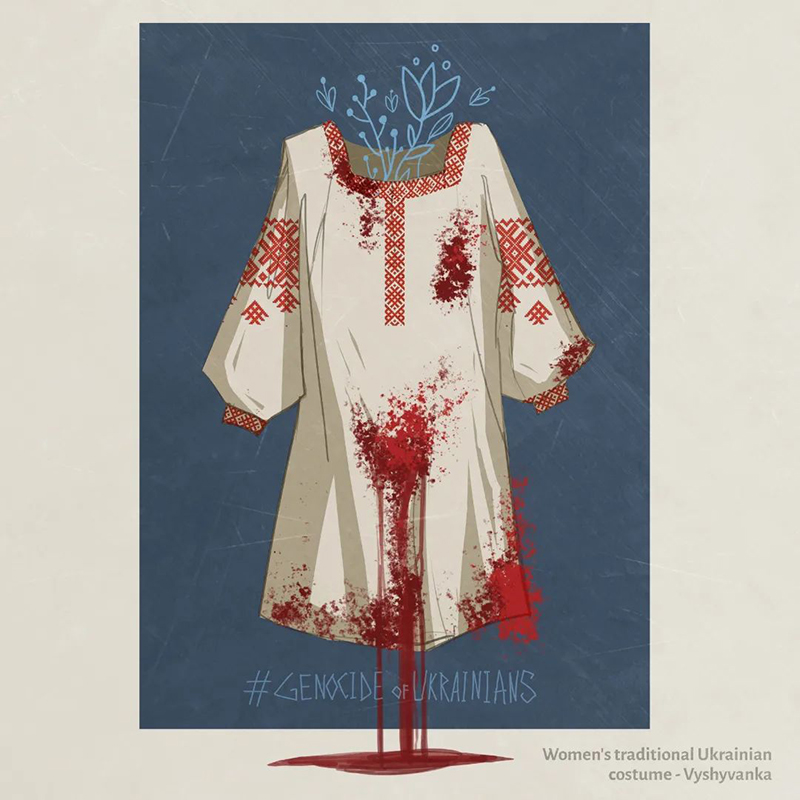
Illustration: @anna_grin_art.
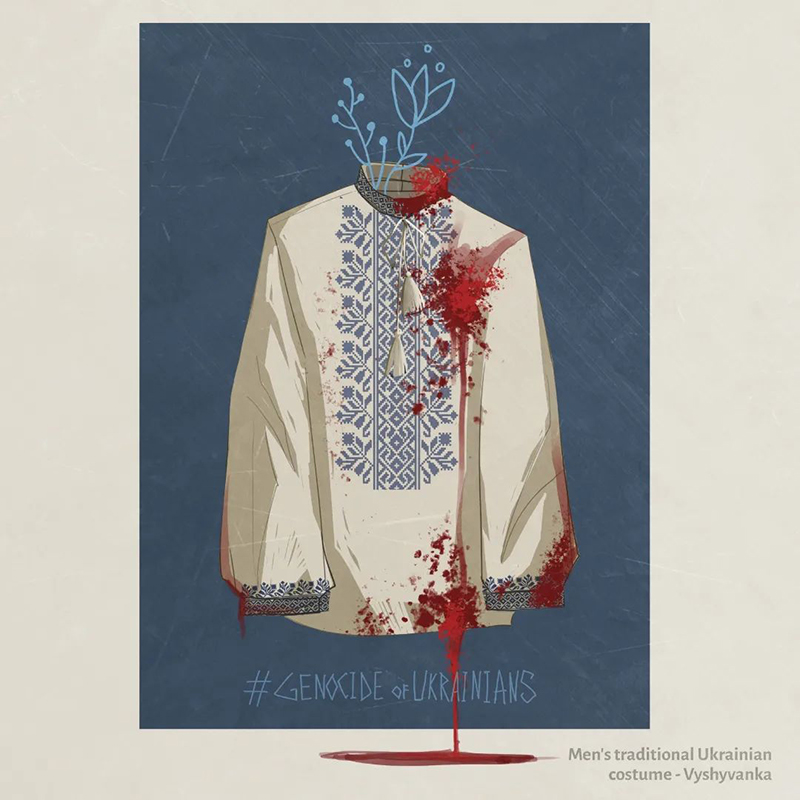
Illustration: @anna_grin_art.
In 2014 and 2015, Ukraine applied to the International Criminal Court in The Hague on war crimes of Russia in Ukrainian territories. In 2018, the coalition of human rights organisations “Justice for Peace in Donbas” provided the International Court with over 100 pages of the documented evidence of systematic sexual crimes. These crimes were committed against Ukrainian women and men in the combat zone in the east of Ukraine. After the full-scale invasion of Russia on the 24th of February, a new consideration of the case on the genocide of the Ukrainian people was initiated. And on the 3rd of March, the team of the International Criminal Court investigators came to Ukraine to investigate war crimes of Russia.
In May, the first court case on rape during the full-scale invasion of Russia to Ukraine was opened. The Russian soldier responsible for this crime was prosecuted. The soldier was drunk and shot a Ukrainian man at his house in the Kyiv region. After that, he raped the dead man’s wife many times, threatening her with murder and violence against her little son, who was hiding nearby in the boiler room.
Cruelty of the Russian army
On the 23rd of March, the first official suspicion of rape of a Ukrainian woman by a Russian soldier appeared. The information was published by Iryna Venediktova, the Prosecutor General of Ukraine, on her Facebook page. The criminal broke into a private house in a village near the town of Brovary and shot the owner. Then, together with another soldier, he repeatedly raped a dead man’s wife near their child.
In the end of May, Liudmyla Denisova, the Ombudsman for Human Rights in Ukraine, informed that the Ombudsman’s hotline had already received nearly 1500 calls about rape and torture committed by the Russian army. Unfortunately, the actual numbers are much higher because many survivors are not ready to talk about their experience, due to stigmatisation of this problem in society and a fear of invaders. It cannot be known exactly how many people have been affected, especially while many cannot safely evacuate from the temporarily occupied territories. Some affected women were tortured to death by Russian troops. Their bodies will be examined to confirm or disprove assault before death.

Many testimonies come from volunteer, psychological, and other public organisations. Some survivors have already contacted the hotline “La Strada-Ukraine”. Kateryna Cherepakha, the president of this organisation, said that calls are mostly from survivors in the occupied territories, and it’s impossible to help them because of active hostilities.
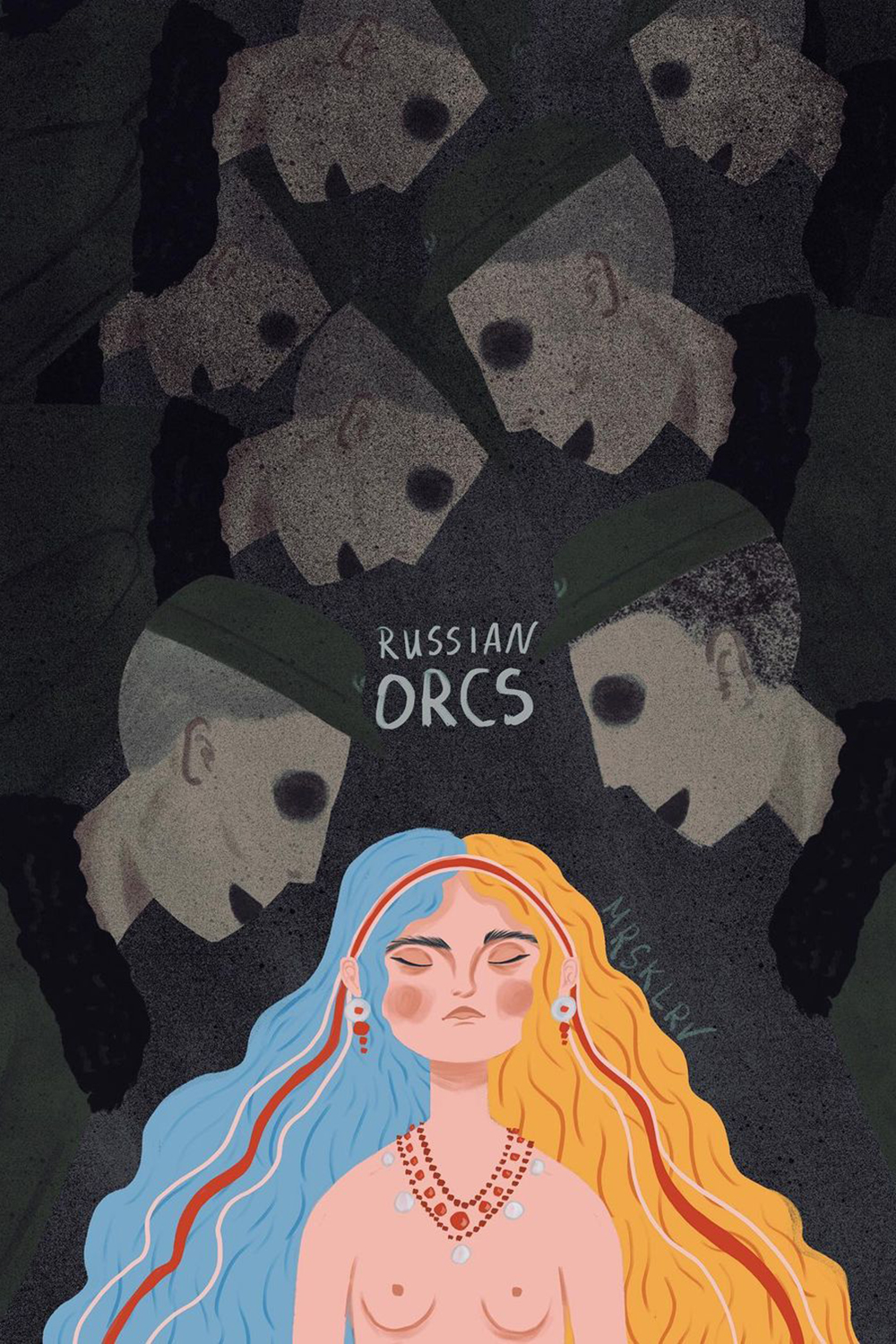
Illustration: @mrsklrv.
During the full-scale war in Ukraine, Russian soldiers showed themselves to be marauders, and now they scored by particular cruelty to the civilian population. The phone conversations intercepted by the Security Service of Ukraine give every reason to think that humanity is just atrophied in their value system. Russian soldiers don’t even try to conceal their cruelty. Liudmyla Denisova, the Ombudsman for Human Rights in Ukraine, told one such eloquent case. In the Kyiv region, Russian invaders said to minor girls that occupiers would rape them so that girls would never want intimacy with any man and wouldn’t give birth to Ukrainian children. This conscious cruelty and meaningful intention to torture civilians only because they are Ukrainian can be considered a part of the genocide of the Ukrainian people by the Russian army.
Russian soldiers abuse women and men, regardless of their age and state of health — babies, teenagers, and elderly people suffer. They deliberately rape and maim, make videos of the horrifying acts, and even consider these crimes as their war trophies. For example, after sexually abusing a baby, the Russian occupant with a lastname Bychkov sent a video to his comrades-in-arms. Sadly, this is not the only case of rape of children. There was also a case of rape of a 45-year-old man with disabilities.
Still, only a few survivors apply to the law enforcement agencies. Crimes of Russian servicemen are being revealed from the intercepted phone calls by the Security Service of Ukraine. Larysa Denysenko, a human rights defender, emphasises that all these recordings have to be carefully investigated by law enforcement officers. In those conversations, occupiers share stories about their awful “achievements” in Ukraine with their comrades-in-arms and relatives. They tell in detail about violence against women and children, often making fun of it. For example, a wife of one Russian service man was amused by the story of three tankers, who raped a 16-year-old girl.
Journalists of the Schemes TV program identified other Russian spouses with a common sentiment from the intercepted conversation: 27-year-old Roman Bykovskyi and Olga Bykovska. The wife, laughing, allowed her husband-occupier to “rape Ukrainian women” with the sole condition of using contraception. The investigators found out that this couple had a child and moved to the occupied Crimea from the Oryol region of Russia. Bykovskyi was injured in the Kherson region, and at the end of April was taken captive near the town of Izium. “People go wild,” — another Russian soldier said in a phone conversation about the atrocity of his army. It’s hard to use the word “people” referring to Russian occupiers.

Examples mentioned here are only drops in the ocean – these numbers increase every day. However, all these stories of sexual violence committed by the Russian army follow a similar pattern: the use of sexual violence as means of torture, gang rapes, rape to death, and also violence against children and adults in front of their relatives, who are often held by force. This once again confirms that rape and other sexual crimes of Russians are not a “side effect” of a war or an exception, but a part of the genocide aimed at the destruction of the Ukrainian nation.
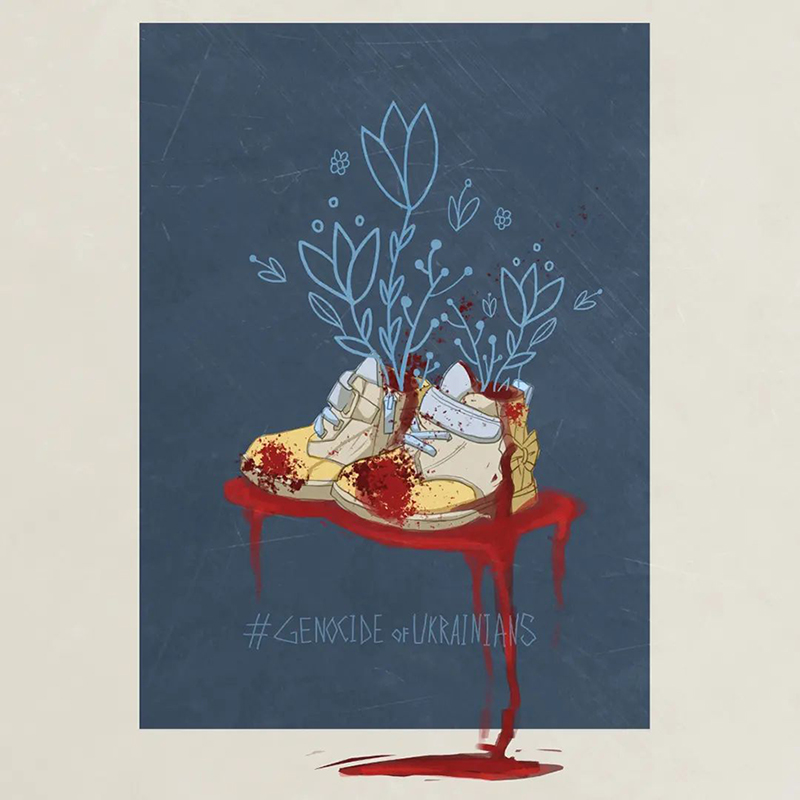
Illustration: @anna_grin_art.
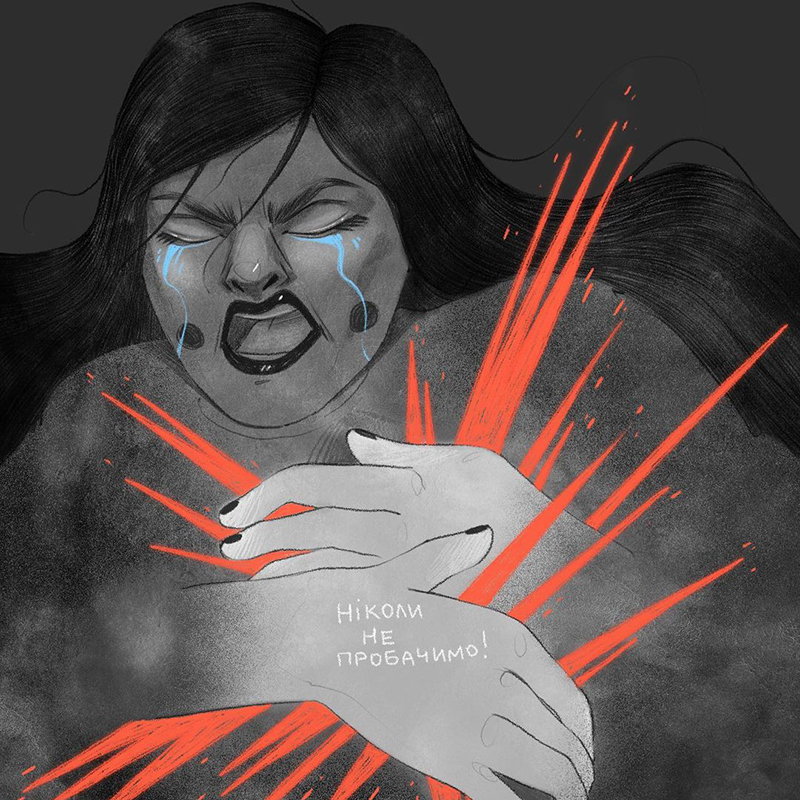
Illustration: @darucia_digital.
Crimes of the Russian army in Ukraine are shocking because of their brutality and hatred for the survivors. Rapists still believe in their impunity. However, Ukraine will do everything possible to make every Russian occupier responsible for what they do. To create justice, it’s very important to inform law enforcement agencies about your experience or experience of people close to you — personally or by someone you trust.

To record the fact of sexual violence you need to turn to:
– emergency medical care (103);
– police (102);
– national hotline on prevention of violence, human trafficking and gender discrimination (0 800 500 335) (from mobile or landline phone) or 116 123 (from a mobile phone);
– the Office of the Prosecutor General (+38 096 755 02 40) — if you aren’t able to turn to the medical service and the police.
Thanks to these testimonies, Ukraine will be able to document and prove crimes in courts and will prosecute Russian war criminals.

